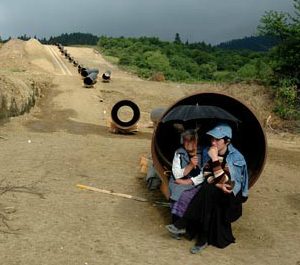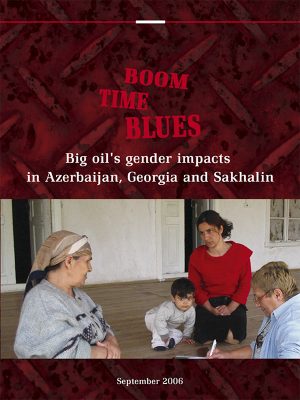Following research and intensive advocacy work by Bankwatch, the EBRD’s established a Gender Action Plan and developed a complex gender toolkit for use by the EBRD, its clients and their consultants, that will hopefully contribute to more gender-based considerations governing its lending.

Would the financial crisis that broke out in 2008 have happened if a lot more women had been present in bank boardrooms? It’s a question that has been raised in recent years alongside growing research evidence of the positive benefits that women can bring to business.
In central and eastern Europe, though, the fundamental, all too prevalent issue of exploitation and abuse of women has crowded out discussions on women in senior management roles.
In 2005, Bankwatch researched and published ‘Boom Time Blues‘, a widely acclaimed report into the negative impacts for women of the Baku-Tbilisi-Ceyhan pipeline and Sakhalin 2 oil and gas projects. The report and our supporting advocacy work moved the European Bank for Reconstruction and Development to seriously consider the gender aspects of its investments.
“Warm and sincere congratulations to your three terrific authors on this exceptionally timely and well-researched publication. I hope it will be very effective in improving the track record of such projects in the future and preventing such outrageous and unacceptable behaviour for all time.”
Robert Goodland, former head of World Bank Environmental department
A few years later the EBRD’s Gender Action Plan was established, and then only in 2010 did we learn about the plan’s actual implementation: the bank has developed a complex gender toolkit for use by the EBRD’s Environment and Sustainability Department, clients and their consultants, that will hopefully contribute to more gender-based considerations governing its lending.
With IFI lending in central and eastern Europe continuing to involve so many natural resource related projects, as well as the likes of supermarket investments, the potential for negative impacts on women remains high, but we are proud to have made gender much more of a red letter issue for the likes of the EBRD.
The public banks must defend and secure women’s rights as a minimum, and then it is to be hoped that they will do a lot more pro-actively to support the women in our region whose skills and creativity have the potential to improve their own livelihoods and that of their communities.

